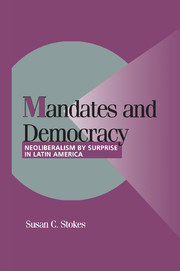Book contents
- Frontmatter
- Contents
- Preface
- 1 ELECTIONS, MANDATES, AND REPRESENTATION
- 2 ELECTIONS AND ECONOMIC POLICY IN LATIN AMERICA
- 3 EXPLAINING POLICY SWITCHES
- 4 ARE PARTIES WHAT'S WRONG WITH DEMOCRACY IN LATIN AMERICA?
- 5 NEOLIBERALISM WITHOUT MANDATES: CITIZENS RESPOND
- 6 MANDATES AND DEMOCRATIC THEORY
- 7 SUMMARY, PREDICTIONS, UNSETTLED QUESTIONS
- References
- Author Index
- Subject Index
- Titles in the series
4 - ARE PARTIES WHAT'S WRONG WITH DEMOCRACY IN LATIN AMERICA?
Published online by Cambridge University Press: 10 December 2009
- Frontmatter
- Contents
- Preface
- 1 ELECTIONS, MANDATES, AND REPRESENTATION
- 2 ELECTIONS AND ECONOMIC POLICY IN LATIN AMERICA
- 3 EXPLAINING POLICY SWITCHES
- 4 ARE PARTIES WHAT'S WRONG WITH DEMOCRACY IN LATIN AMERICA?
- 5 NEOLIBERALISM WITHOUT MANDATES: CITIZENS RESPOND
- 6 MANDATES AND DEMOCRATIC THEORY
- 7 SUMMARY, PREDICTIONS, UNSETTLED QUESTIONS
- References
- Author Index
- Subject Index
- Titles in the series
Summary
Political parties express and channel citizens' interests, provide predictable choices to voters, link government to civil society, impose order on legislative processes, and discipline politicians: this is the conventional wisdom. To work well, democracy requires that these things happen. But observers contend that political parties in many of Latin America's democracies are weak or uninstitutionalized, and party systems volatile and fragmented. They also contend that these democracies suffer from citizens with ill-defined and fluctuating preferences, campaigns that fail to predict policy, tenuous links between civil society and the state, chaotic legislative processes, and incompetent and undisciplined officeholders. It is tempting to blame weak parties for the deficiencies of Latin America's democracies.
In this chapter I evaluate these claims, in particular that weak political parties and uninstitutionalized party systems obstruct the fulfillment of mandates by elected governments. Before turning to this analysis, I will attempt a certain theoretical ground-clearing. Whether parties should be expected to induce officeholders to act consistently with mandates and to represent constituents' interests depends on one's view of what parties are: how they are structured and what their objectives are. Because the effect of parties is controversial – because in some theoretical traditions parties make governments more representative and in others less – it is not obvious a priori what the normative significance of strong parties will be.
Parties and Democracy
Parties Are Good for Democracy
The purported advantages of parties are two.
- Type
- Chapter
- Information
- Mandates and DemocracyNeoliberalism by Surprise in Latin America, pp. 102 - 121Publisher: Cambridge University PressPrint publication year: 2001

